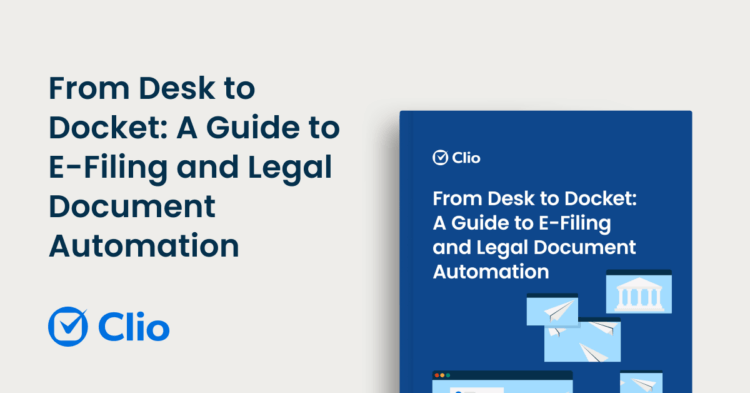Where legal e-filing and case management meet
Discover electronic filing for Texas firms built into the industry’s leading case management software.
-

File court documents faster
No more uploading and downloading files in separate systems. File and serve Texas court documents electronically from the same place you manage your firm.
-

Meet filing requirements with confidence
Keeping up with varying rules from court to court can be a headache. Clio helps you stay on top of court rules and deadlines so you can file on time, every time.
-

Get real-time status updates
Know the status of your Texas court filings in real-time. Court-stamped copies and filing expenses are automatically recorded to your case, making it easy to recover 100% of your costs.
A court e-filing service your firm can trust
Clio File is built into the most reliable case management solution with data security protocols that go beyond industry compliance requirements.
Texas e-filing resources
Ready to explore e-filing in Texas courts? Here are some helpful software resources.
Start e-filing in Texas today
Clio File is currently available in Texas, with more states on the way! Book a demo today, or let us know where you want Clio File to stop next.
Book a Demo
Let Us Know
E-File Texas FAQs
What is Texas electronic filing?
Texas electronic filing (e-filing) allows law firms to submit legal documents to Texas courts online, eliminating the need for filing paper documents in person. This system enables law firms to file and track documents electronically while ensuring compliance with Texas-specific court rules and providing real-time updates on filing status.
Book a demoWhat is Clio File, and how does it work for Texas e-filing?
Clio File is a built-in e-filing and e-service solution within Clio Manage, designed to streamline the court filing process for law firms. It enables law firms in Texas to file documents directly from Clio’s case management system. With Clio File, you can submit filings to Texas courts, track filing statuses in real-time, and automatically receive court-stamped copies once approved. The service supports criminal, civil, and appellate cases, ensuring compliance with Texas-specific court rules and requirements.
Book a demoHow do you e-file court documents in Texas with Clio File?
To e-file court documents in Texas with Clio File, follow these general steps:
- Activate E-filing: Set up Clio File by navigating to Settings > E-filing in Clio Manage. Complete your firm’s details, review the terms and conditions, and activate the service.
- Designate Users: Admins can designate users as e-filers in the E-filing settings by selecting firm users from the dropdown menu and saving their details.
- Prepare and Submit Documents: Open the relevant matter in Clio Manage, go to the E-filing subtab, and select the document you wish to file. Choose the appropriate court, county, and case category, and upload your documents. You can submit multiple documents in a single filing.
- Track Filing Status: After submission, Clio File tracks your filing status in real time. You will receive notifications when your filing is in draft, submitted, accepted, rejected, or reviewed by the court.
- Access Court-Stamped Copies: Once the court accepts your filing, Clio File automatically updates the court-stamped copies in your Documents tab for easy access.
How do I track my e-filing in Texas state courts?
Clio File offers real-time status updates on your e-filings. After submission, you can monitor the status of your filings in real time within the E-filing subtab. Statuses include:
- Draft: Filing has been created but has yet to be sent.
- Submitted: The filing has been sent to the court’s Electronic Filing Manager (EFM).
- Accepted: The Texas court has approved the filing.
- Rejected: The court has denied the filing.
- Review Complete: The court has successfully reviewed the filing.
- Canceled: A firm user has canceled the filing.
Can I both file and serve documents in Texas through Clio File?
Yes, Clio File allows you to both file and serve documents in Texas state courts. After filing court documents electronically through Clio File, you can use its e-service functionality to serve those documents to clients, opposing counsel, and other relevant parties directly from within the system. This dual capability streamlines both the filing and service processes, ensuring all necessary parties receive the documents quickly and securely.
Book a demoHow do I correct an issue with an e-file Texas submission?
If an e-file submission in Texas encounters an issue, follow these steps to correct it:
- Review Filing Status: Check your filing status in Clio File’s E-filing subtab to identify if the document was accepted, rejected, or pending.
- Identify the Issue: If the court rejects the filing, Clio File notifies you of the reason, such as incorrect formatting or missing information.
- Make Necessary Corrections: Correct any errors in your document, ensure it meets the court’s specific requirements, and re-upload it.
- Resubmit: Once corrected, resubmit the document through Clio File for e-filing.
Clio File provides real-time updates, allowing you to monitor your filings and resolve issues efficiently to ensure compliance with Texas court rules.
Book a demoHow do I access court-stamped copies after submitting a Texas e-file
After the court accepts your Texas e-file submission, Clio File automatically updates the court-stamped copies of the relevant matter in the Documents tab.
Once the court processes your filing, these copies are returned and made available directly within your case management system for easy access and tracking. This automated feature eliminates manual retrieval and ensures you always have up-to-date, court-approved documents stored within your system.
Book a demo






